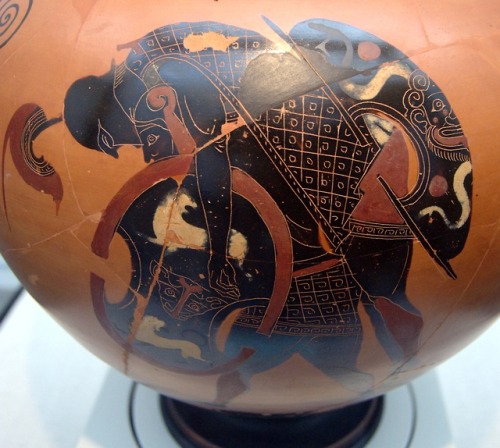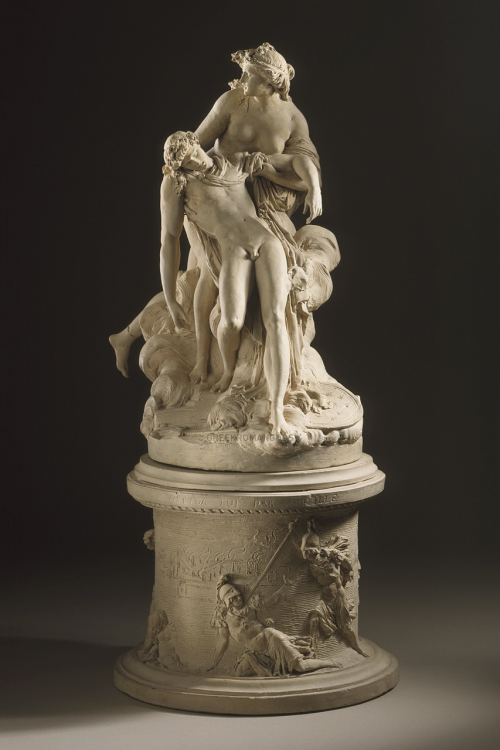#akhilleus
Ajax carries the body of the fallen Achilles off the battlefield at Troy. Side A of an Attic black-figure amphora, attributed to Exekias; ca. 540-530 BCE. From Vulci; now in the Staatliche Antikensammlungen, Munich.
Post link
Meanwhile, the son of Peleus did not yet forget
his spirit, for in his unconquerable limbs
the black blood still boiled with eagerness for war.
Then not one of the Trojans dared to come near him,
even after he was shot, but stood far far away, like when a lion
makes countrypeople in the woods stand in awe, though it
has been shot by a hunter; despite being struck in the heart by an arrow,
it does not forget its courage, but stares about savagely
and roars terribly from its bristling jaws.
Just so, anger and the deadly wound roused the son of Peleus’
spirit to its highest, though the god’s arrow broke him.
Even so, he sprang up and charged among his enemies,
mighty spear poised: he killed godlike Orythaon,
Hektor’s noble companion, having struck him through the temple -
his helmet did not stop the great spear as it was intended to,
and instead it went straight through helm and skull
into the nerves of the brain, and put an end to his great life.
Hipponoos too he broke, thrusting his spear under his brow
into the roots of his eye; his eyeball fell to the earth
from under his eyelid, and his spirit flew down to to the house of Haides.
Alkathoos then he stabbed through the jaw
and cut away his whole tongue: he fell to the ground,
breathing his last, the spearpoint coming out of his ear.
And these he slew when they rushed to face him,
that godlike man, and he took the spirits of many others
as they fled, for in his heart the blood still boiled.
(Quintus of Smyrna, Posthomerica 3.138-63; my translation)
ὁ δ᾽ οὔπω λήθετο θυμοῦ
Πηλείδης: ἔτι γάρ οἱ ἀμαιμακέτοις ἐνὶ γυίοις
ἔζεεν αἷμα κελαινὸν ἐελδομένοιο μάχεσθαι.
οὐδ᾽ ἄρα οἱ Τρώων τις ἐτόλμα ἐγγὺς ἱκέσθαι
βλημένου, ἀλλ᾽ ἀπάνευθεν ἀφέστασαν, εὖτε λέοντος
ἀγρόται ἐν ξυλόχοισι τεθηπότες, ὅν τε βάλῃσι
θηρητήρ, ὁ δ᾽ ἄρ᾽ οὔτι πεπαρμένος ἦτορ ἄκοντι
λήθεται ἠνορέης, ἀλλὴ στρέφετ᾽ ἄγριον ὄμμα
σμερδαλέον βλοσυρῇσιν ὑπαὶ γενύεσσι βεβρυχώς.
ὣς ἄρα Πηλείδαο χόλος καὶ λοίγιον ἕλκος
θυμὸν ἄδην ὀρόθυνε: θεοῦ δέ μιν ἰὸς ἐδάμνα.
ἀλλὰ καὶ ὣς ἀνόρουσε καὶ ἔνθορε δυσμενέεσσι
πάλλων ὄβριμον ἔγχος: ἕλεν δ᾽ Ὀρυθάονα δῖον,
Ἕκτορος ἐσθλὸν ἑταῖρον, ἔσω κροτάφοιο τυχήσας:
οὐ γάρ οἱ κόρυς ἔσχε μακρὸν δόρυ, μαιμώωντος
ἀλλὰ δι᾽ αὐτῆς αἶψα καὶ ὀστέου ἔνδον ἵκανεν
ἶνας ἐς ἐγκεφάλοιο, κέδασσε δέ οἱ θαλερὸν κῆρ.
Ἱππόνοον δ᾽ ἐδάμασσε κατ᾽ ὀφρύος ἔγχος ἐρείσας
ἐς θέμεθλ᾽ ὀφθαλμοῖο: χαμαὶ δέ οἱ ἔκπεσε γλήνη
ἐκ βλεφάρων: ψυχὴ δὲ κατ᾽ Ἄϊδος ἐξεποτήθη.
Ἀλκαθόου δ᾽ ἄρ᾽ ἔπειτα διὰ γναθμοῖο περήσας
γλῶσσαν ὅλην ἀνέκερσεν: ὁ δ᾽ ἐς πέδον ἤριπε γαίης
ἐκπνείων, αἰχμὴ δὲ δι᾽ οὔατος ἐξεφαάνθη.
καὶ τοὺς μὲν κατέπεφνε καταντίον ἀΐσσοντας
δῖος ἀνήρ: πολλῶν δὲ καὶ ἄλλων θυμὸν ἔλυσε
φευγόντων: ἔτι γάρ οἱ ἐνὶ φρεσὶν ἔζεεν αἷμα.
- Venus and Aeneas or Achilles (?)
- 1791–1792
- Joseph Chinard (1756–1813)
- Terracotta
- Los Angeles County Museum of Art
** Visit my Links page for my other blogs & Facebook Pages
Post link


